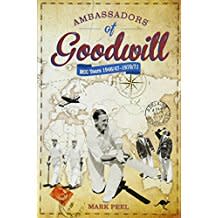Ambassadors of Goodwill: On tour with the MCC 1946-71.
Mark Peel

Ever since Victorian times, the MCC had fully embraced the amateur ideal that cricket was more than a game, it was the very essence of camaraderie and good sportsmanship. Yet for all their evangelising and moral posturing, the game’s privileged elite were part of a British establishment which revelled in its national prestige and imperial hegemony. Winning at cricket, as with other sports, was essential to maintaining that hegemony. This books looks at MCC tours between 1946-47 and 1970-71 and assesses to what extent they were able to marry these conflicting objectives.
While the amateur ideal held good in the immediate post-war era, it became harder to maintain once Len Hutton was appointed England’s first professional captain in 1952. An intense Yorkshireman with little love for his opponents, his tour to the West Indies in 1953-54 was a diplomatic disaster, and his epic victory in Australia the following year was somewhat tarnished by the aloofness of his players towards their hosts. After Peter May’s disastrous tour to Australia in 1958-58 when England lost 4-0 amid bitter allegations of throwing, MCC resolved to improve their image. The appointment of the forceful Walter Robins, an amateur of the old school, to manage MCC in the West Indies 1959-60 proved significant, because under his no-nonsense leadership the team went out of their ways to win friends off the field as well as winning on it.
The appointment of managers of greater stature ensured MCC’s ambassadorial role was given priority during the goodwill tours of the early-mid 1960s, but changing attitudes thereafter put that diplomacy to the test. England’s commendable win in the West Indies 1967-68 was marred by crowd unrest and third world nationalism, and the likely inclusion of Basil D’Oliveira, England’s Cape-Coloured all-rounder, on the MCC tour to South Africa in 1967-68 caused all kind of political ructions from the white supremacist government in South Africa. Their covert campaign to keep D’Oliveira out of the team coalesced with the England selectors’ own reasons for omitting him- not known at the time or subsequently and which this book reveals.
After the cancellation of the South African tour following D’Oliveira’s last-minute inclusion, and a disastrous alternative to Pakistan, where the team became embroiled in a mass movement against the military government of Ayub Khan, further trouble marred MCC’s Ashes-winning tour to Australia in 1970-71. This time it was the hard-nosed professionalism of the captain Ray Illingworth pitted against the amateur ideals of the manager David Clark and the vice-captain Colin Cowdrey. It was Illingworth who emerged victorious but the image of the game suffered, symbolic of MCC’s waning influence in a more materialistic age.
Book Details:
- Author: Mark Peel
- On Submission
-
Rights Sold
- UK: Pitch Publishing

Mark Peel
After Harrow and Edinburgh where he read History, Mark Peel taught History and Politics at Fettes between 1983-2007.A keen biographer, his first book, England Expects: A Life of Ken Barrington, was published in 1992 and won the Cricket Society's Literary Award for the best cricket book of the year.He followed this with biographies of the England cricketers, Colin Milburn and Colin Cowdrey, the maverick headmaster, Anthony Chevenix Trench, the Methodist minister and pacifist, Donald Soper, and more recently the former Labour minister and co-founder of the SDP, Shirley Williams.
More about Mark Peel
Book Reviews
-
"this excellent book of cricket history…Anyone with an interest in the game will enjoy Ambassadors of Goodwill. For those already familiar with these tours who have read some of the books about them it is interesting to see all the strands of the stories drawn together. For those relatively new to the subject it contains a fascinating story of how cricket tours fundamentally changed in the years after the Second World War. Either way the book is highly recommended."
Cricketweb.net -
"Covering 18 tours as well as re-examining the rumpus over the one that never was because of the colour of D’Oliveira’s skin, the book is truly a tour de force.... The author has clearly had minimal concern about who should be spared the revelation of youthful (or less youthful) indiscretions or misdemeanours – and the book is the more compelling to read because of this.... There are many familiar tales but there is much that was new to me,and a strength of the book is the author’s admirable objectivity as he re-visits some of the more contentious trips – from Hutton and Palmer striving to cope with Caribbean politics to Illingworth, seeking to win the Ashes, at war with manager Clarke and his more diplomatic agenda. There is also, I felt, as objective an account of the D’Oliveira saga as we shall ever get, not bowing to Peter Oborne as the fount of all wisdom."
The Cricket Statistician. -
"Ambassadors of Goodwill: MCC Tours 1946/47-1970-71 looks at the death of the amateur ideal in English cricket. Written by Mark Peel, it employs a rich vein of material from MCC archives, providing a fresh appraisal of post-war tours and the players involve. It is a fascinating book that will interest students of the game."
Yorkshire Post